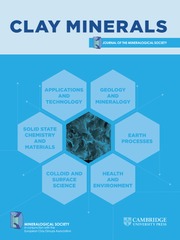Article contents
Structural transformation of kaolin as an active matrix for the in situ synthesis of zeolite Y
Published online by Cambridge University Press: 23 December 2020
Abstract
To produce an optimized matrix for the in situ crystallization of zeolite Y, a commercial kaolin chemically treated with NaOH solution at 97°C for 24 h and thermally transformed from 750 to 1100°C was studied. The kaolin calcined at 750°C has 20% more reactive tetrahedral aluminium species for the synthesis of zeolite Y than kaolin calcined at 865°C. The kaolin calcined at 1000°C has amorphous silica zones that may be extracted using caustic solution; this increases the surface area by a factor of 16 and generates mesopores ~5 nm in diameter. These structural changes in the calcined and treated kaolins were combined to prepare microspheres of the mesoporous matrix, upon which well-dispersed crystals of zeolite Y crystallized.
- Type
- Article
- Information
- Copyright
- Copyright © The Author(s), 2021. Published by Cambridge University Press on behalf of The Mineralogical Society of Great Britain and Ireland
Footnotes
Associate Editor: A. Turkmenoglu
References
- 4
- Cited by


